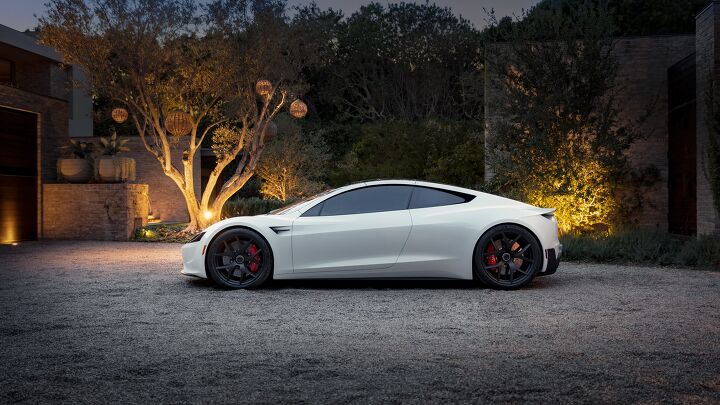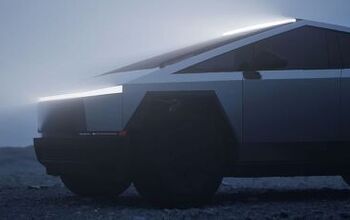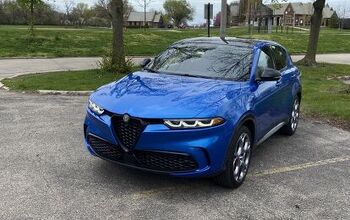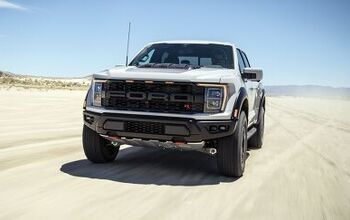Musk: Tesla Roadster Will Use SpaceX Tech and Have Rocket Boosters

Tesla presented the “new” Roadster back in 2017, but the car isn’t expected to officially launch until next year. CEO Elon Musk has made some big promises about the car, including that it could break the one-second 0-60 mph time barrier. We’re now hearing more grandiose claims about the car, with Musk saying that it would feature rocket technology thanks to a partnership with his other company, SpaceX.
Musk made the claims in an interview with former CNN personality Don Lemon, saying that a flying Roadster is “not out of the question.” Though the Cybertruck is having weird rust issues, Musk noted it as Tesla’s best vehicle but said the Roadster will outperform it.
“The only way to do something cooler than the Cybertruck is to combine SpaceX and Tesla technology to create something that’s not really a car. It’s going to be really cool. It’s going to have some rocket technology in it.” It’s worth noting that Musk also claimed the Cybertruck may be used as a boat, so this isn’t the first wild claim about a new Tesla model.
Hopeful buyers can reserve the Roadster with a massive $50,000 deposit, but the final price could exceed $200,000 if Musk’s earlier statements hold true. Before buying Twitter, he tweeted that the car would be available with a SpaceX package that adds 10 “small rocket thrusters arranged seamlessly around the car.” So, a flying, rocket-powered EV that is somehow street-legal. Right.
These are wild claims, and while Tesla has managed to deliver on some of Musk's promises, it has also fallen short in some instances. The Cybertruck did not land with the affordable price tag Musk claimed, and it’s not quite as bulletproof as initially expected. It’s also unclear how Tesla could integrate rockets with a road car and not face immediate lawsuits from YouTube idiots trying to see how quickly it can accelerate.
[Image: Tesla]
Become a TTAC insider. Get the latest news, features, TTAC takes, and everything else that gets to the truth about cars first by subscribing to our newsletter.

Chris grew up in, under, and around cars, but took the long way around to becoming an automotive writer. After a career in technology consulting and a trip through business school, Chris began writing about the automotive industry as a way to reconnect with his passion and get behind the wheel of a new car every week. He focuses on taking complex industry stories and making them digestible by any reader. Just don’t expect him to stay away from high-mileage Porsches.
More by Chris Teague
Latest Car Reviews
Read moreLatest Product Reviews
Read moreRecent Comments
- NJRide My mom had the 2005 Ford 500. The sitting higher appealed to her coming out of SUVs and vans (this was sort of during a flattening of the move to non-traditional cars) It was packaged well, more room than 90s Taurus/GM H-Bodies for sure. I do remember the CVT was a little buzzy. I wonder if these would have done better if gas hadn't spiked these and the Chrysler 300 seemed to want to revive US full-size sedans. Wonder what percent of these are still on the road.
- 28-Cars-Later Mileage of 29/32/30 is pretty pitiful given the price point and powertrain sorcery to be a "hybrid". What exactly is this supposed to be?
- MRF 95 T-Bird I own a 2018 Challenger GT awd in the same slate gray color. Paid $28k for it in late 2019 as a leftover on the lot. It’s probably worth $23k today which is roughly what this 2015 RT should be going for.
- Mike978 There is trouble recruiting police because they know they won’t get support from local (Democratic) mayors if the arrests are on favored groups.
- FreedMike I'm sure that someone in the U.S. commerce department during the 1950s said, "you know, that whole computer thing is gonna be big, and some country is going to cash in...might as well be us. How do we kick start this?" Thus began billions of taxpayer dollars being spent to develop computers, and then the Internet. And - voila! - now we have a world-leading computer industry that's generated untold trillions of dollars of value for the the good old US of A. Would "the market" have eventually developed it? Of course. The question is how much later it would have done so and how much lead time (and capital) we would have ceded to other countries. We can do the same for alternative energy, electric vehicles, and fusion power. That stuff is all coming, it's going to be huge, and someone's gonna cash in. If it's not us, you can damn well bet it'll be China or the EU (and don't count out India). If that's not what you want, then stop grumbling about the big bad gubmint spending money on all that stuff (and no doubt doing said grumbling on the computer and the Internet that were developed in the first place because the big bad gubmint spent money to develop them).


































Comments
Join the conversation
I'm sure it will be really easy to insure a car with rockets of any kind installed. I heard the boosters were for countering lateral g force during cornering, and possibly for straight line braking. I can't wait to be "blown away" by one of these things! Sideways rocket jets on that thing pointed at ME in my convertible??? I'll slash your fkin tires if I see one on the street with real rockets on it. NOPE.
Elon Musk is a geek. When you make a car with prodigious torque you run into wheelspin so you develop much better traction control. So now we have hit the limits of tire adhesion. Going to 'first principles' and defining the 'problem' as "quicker acceleration" it's a natural step to employ reaction motors and hey why not reaction engines and what if we used air or water vapor and they were not only 'reusable' but 'rechargeable' and oh by the way "acceleration" isn't limited to one direction we could use this for braking or how about a full RCS and hey you know a vertical hop might come in handy because the roads are crumbling.
This is what you get when geeks have money and other geeks to bounce ideas off of.